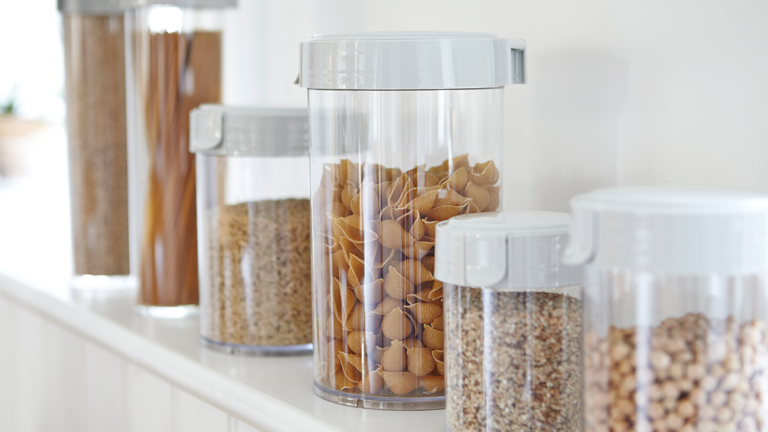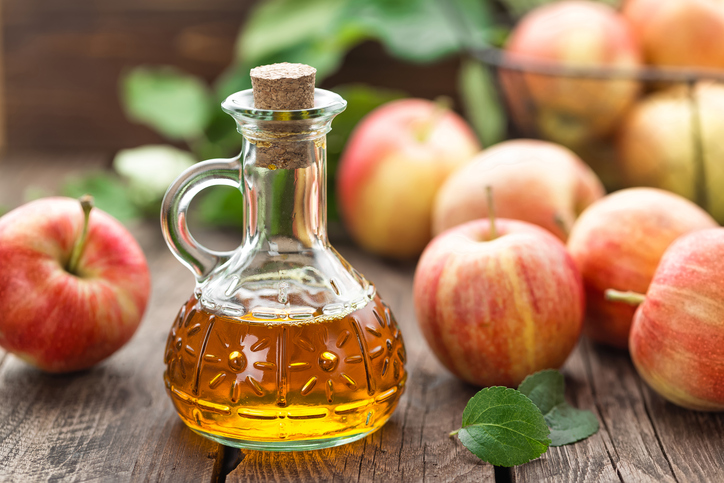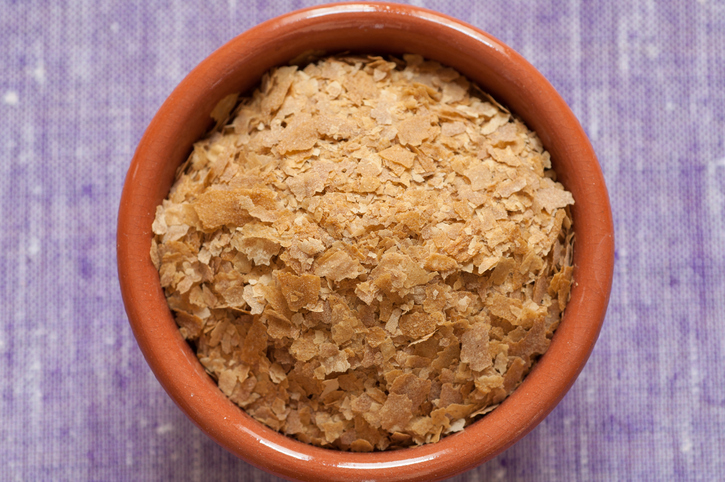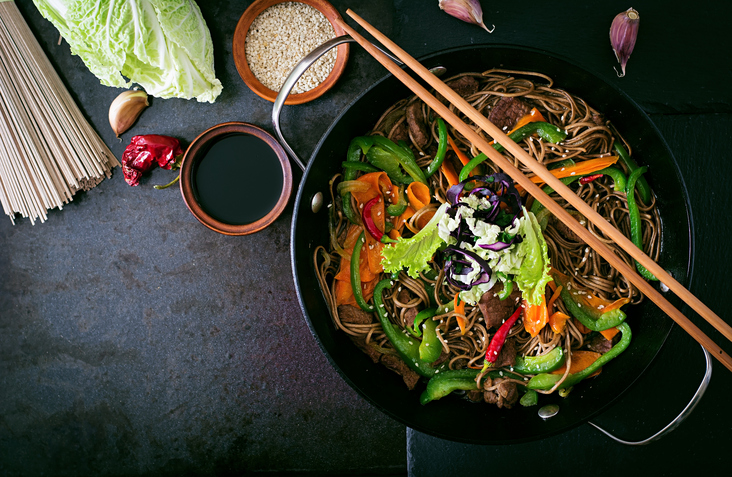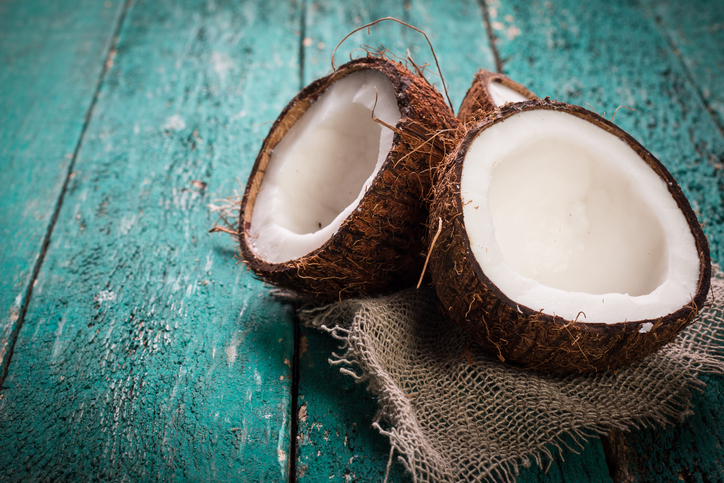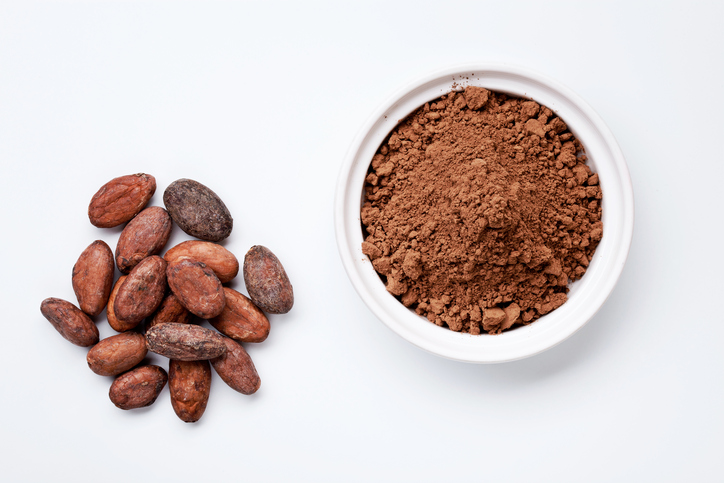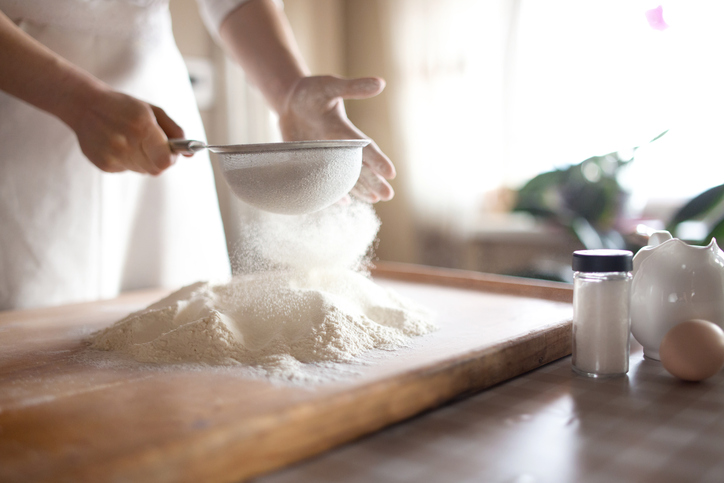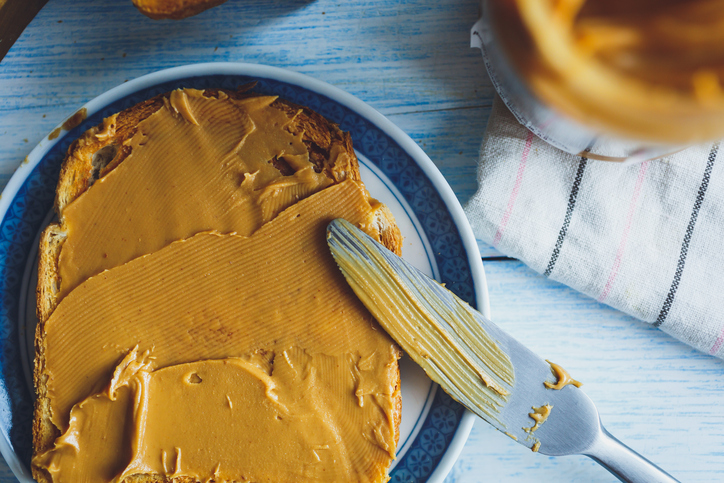We’re all about making healthy easier, which is why we’re rounding up the organic foods every healthy food lover needs in their pantry
People constantly ask us: what is organic and is it worth it? The bottom line is, organic food can be one of the healthiest ways to eat whilst being easy to do. By choosing organic produce, you avoid a number of potentially harmful chemicals that are used in normal farming. These include synthetic pesticides, weedkiller, preservatives and all sorts of additives. But it can be expensive, which is why we have chosen the staples we think every healthy kitchen needs and those in which a little can go a long way.
The Soil Association’s strict guidelines ensure food manufacturers and farms keep to their organic promise, and secure their organic symbol (see below). They say, ‘It’s simple – more people buying organic food means more organic farms. More organic farms means fewer pesticides, more wildlife and more animals raised under the highest standards’.
Just how high are these standards? Well, consider this – research published in the British Journal of Nutrition has found significant nutritional differences between organic and non-organic farming. In 2014, the team at Newcastle University found organic crops are up to 60 per cent higher in a number of key antioxidants than conventionally-grown ones. As well as this, research has found organic milk and meat contain around 50 per cent more omega-3 fatty acids than conventionally produced products.
Here are the must-haves the Healthista team can’t live without and the organic choices we think will help make healthy cooking easy.
1. Apple cider vinegar
Take a couple of tablespoons of apple cider vinegar a day and you’ll never look back. It doesn’t sound like the most appetising, but the fermented apple juice is a favourite amongst nutritionists and dieticians, due to its health benefits, some of which are supported by science, including weight loss, lowering blood sugar levels and most usefully, a relief of type 2 diabetes symptoms.
People with type 2 diabetes can have high blood sugar levels for long periods of time, due to a inability to produce, or resistance to, the hormone insulin. In some studies, apple cider vinegar has shown the ability to regulate these levels to be stable. It can also increase the feeling of fullness and has only less than five calories per tablespoon.
Try it: It’s best to go for organic and unfiltered types such as Braggs Organic Apple Cider Vinegar, £5.49, which will have the highest levels of goodness. It contains the ‘mother’ of vinegar, which occurs naturally as strand-like enzymes of connected protein molecules. Drink a large glass of water with two tablespoons of the vinegar before a meal, (or before bed, for those with diabetes), to balance out blood sugar levels. It can also be added as a dressing to salads or vegetables. Take a tablespoon with a pint of warm water in the morning to help stabilise blood sugar throughout the day.
2. Yeast flakes
If you’re new to a dairy-free life and missing cheese, a vegan will recommend yeast flakes. Blandly named but not bland to taste, vegans love their mildly nutty, cheesy taste. Nutritional yeast also has a high level of vitamins and minerals that the vegetarian or vegan diet (or any diet, in fact), can lack. It’s a complete protein, containing at least nine of the 18 amino acids the body can’t produce, as well as B vitamins which support healthy hair, skin and nails. These occur naturally, however some yeast flakes are fortified with vitamin B12, too, needed for the proper functioning of the brain, red blood cells and nerve tissue; a vitamin found in meat and animal products that is often lacking in the diets of vegans.
Try it: We are a fan of Bioreal’s Organic Nutritional Yeast flakes, £3.75. There are endless uses for this versatile food, but start off adding small amounts to things like pasta sauces (really lovely in arabiata or Napoletana recipes), scrambled tofu or eggs, as well as sprinkled on soup and cooked kale. You’ll soon find yourself experimenting with it in everything. Try it also added to an oil or water for creating a creamy sauce. Just start off small, using too much can make food tasty salty and tart.
3. Pasta alternatives
Pasta has had a huge upgrade. Amongst the starchy white penne, tagliatelle and farfalle are healthy wheat-free alternatives that promise to deliver fibre, a protein punch and nutritionally dense dinner – and they taste more delicious too. Made from beans, pulses, legumes, plants or even seaweed, a little can fill you up more than that wheaty-variety often without any carbs or gluten. Pumpkin seed tagliatelle, for example, which will certainly get people talking the next time you host dinner this autumn, is made by grinding down pumpkin seeds. We all know pasta makes you happy, but pumpkin seeds have scientifically been found to be a mood-boosting food, increasing levels of serotonin with the help of the amino acid tryptophan. Whilst quinoa pasta has all nine essential amino acids, and black jasmine rice pasta is bursting with energy, lentil and flax penne is packed with fibre and protein. Say goodbye to carb-induced guilt!
Try it: We love Pramoleum Pumpkinseed Tagliatelle, £4.79, which is organically produced amongst five cooperative farmers from the Austrian region Pramtal. Not only does Profusion’s Lentil and Flax Penne, £3.49, look a divine red colour on the plate, taste nutty and are super-filling.
4. Coconut vinegar
Coconut has spawned a revolution with a vinegar now amongst other healthy hybrid. We’re hooked. If apple cider vinegar isn’t your idea of fun, coconut vinegar has a little extra sweetness but the same high health profile. It’s made with the sap of the coconut, and considering coconut trees are grown in nutrient rich soil, you can expect some good stuff packed into the vinegar. We are talking nine amino acids, which play many roles in the body such as keeping the immune system in tip-top shape, vitamins B and C, fibre and since it is also fermented, it may even contain some probiotic powers, which feed our microbiome (the good gut bugs that keep us healthy on many levels). Like apple cider vinegar, you will notice a ‘mother’ at the bottom of the bottle, a cloudy web of proteins and enzymes.
What’s more, coconut vinegar is low on the glycemic index (GI), a positive sign for those concerned with blood sugars, heart disease risk and diabetics. The glycemic index categorises carbohydrate-containing foods by how much they raise your blood sugar level. Foods such as white pasta, bread and potatoes are high in GI.
Try it: Coconut Merchant’s Coconut Vinegar, £4.99, is the most natural form – unpasteurised and free from preservatives. This gives it a full flavour which either be diluted into water for detoxifying drink, or added to salads and savoury dishes. Or for a more interesting dressing, add a tablespoon to some Dijon mustard with half a mashed avocado – creamy and dreamy!
5. Tamari (gluten-free soy sauce)
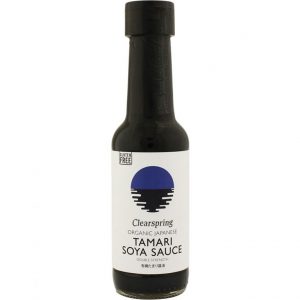
Try it: A few drops of Clearspring Organic Tamari Soya Sauce, £3.29, will go a long way, bringing out a delicious savoury taste in vegetables, grains and soups. It boasts using twice as many beans as ordinary soya sauces, using a 500 year old recipe with traditional processes and equipment, ageing and fermenting in cedarwood kegs over two summers – fancy!
6. Table salt alternatives
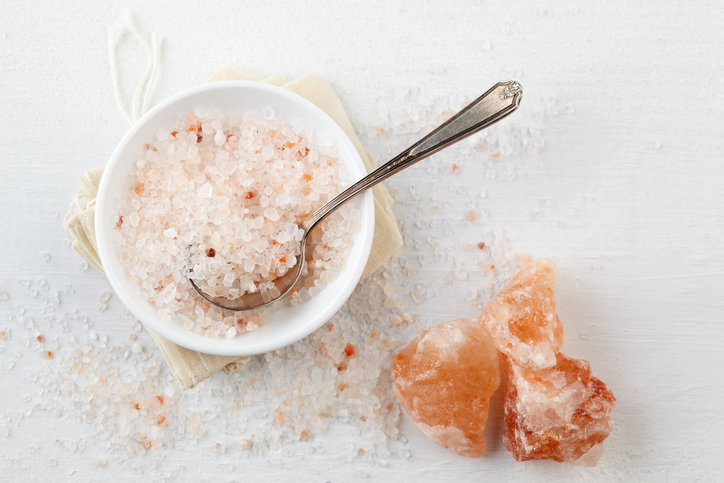
You don’t need a degree in nutrition to know too much salt is a path straight to health complications, and yet many of us still can’t get enough of the savoury stuff. The facts are, many of us are over doing the recommended one teaspoon (6g) a day according to the NHS, putting us at risk of high blood pressure (which has no symptoms) and therefore stroke and heart disease. And it’s not just table salt we are talking, but the ‘hidden sugars’ in foods such as meats, cereals and even our gravy and stock cubes.
But before you eridacate it from your diet, it’s worth noting a low-salt diet is also linked to high cholesterol, heart failure and type 2 diabetes. You can’t win, you really can’t. What’s the solution? Well watching your intake, of course, but you may have heard of alternatives such as Pink Hamalayan salt, which does indeed, come from the Himalayas. These salt fields are the same age as the earth, and the salt is hand-extracted and minimally processed. Unlike regular table salt, which is stripped of its minerals during the production process, Pink salt retains more traces of minerals such as calcium, potassium, magnesium and iron, although science is yet to officially announce it as salt’s healthier counterpart. After all, pink or healthy, it is still salt.
Try it: We ADORE salty stuff at Healthista HQ and love Naturita Pink Himalayan Salt Fine, £5.85. We also always have a bottle of Herbamere Herb Seasoning Salt, £2.40, in the offices to top our sales with. This clever blend of sea salt and 12 fresh, organic herbs and vegetables adds flavour to your meals so less salt is needed, in three flavours of original, spicy and low salt.
7. Raw cacao
AKA, chocolate, but not as you know it. In it’s purest form, cacao has hundreds of compounds that have been proven to improve pretty much everything from mood, cardiovascular health and even libido. You can still get your fix of cacao’s health properties without the added sugars that you find in commercial chocolate bars at the local newsagents. Amongst the long list of compounds is flavonoids, which have antioxidant activity. Foods rich in flavonoids, which also include red wine and green tea, are linked to heart health benefits, lowering blood pressure and cholesterol.
Ever wondered why you feel better after eating chocolate? Research has shown it actually boosts our happy chemicals in the brain – serotonin, as well as acting as an aphrodisiac – that’s the PEA compound. Raw cacao is also one of the best food sources of magnesium, which is crucial for energy production, a healthy brain and nervous system as well as sleep. Midnight snack, anyone?
Try it: To reap these benefits, it’s important to go raw, such as Bioglan Superfoods Raw Cacao Powder, £6.99. It’s won’t taste like what you are used to, in fact it will taste better. Mix with natural sweeteners such as in a fruit smoothie, or make your own ice cream with frozen bananas, cacao powder and coconut milk, with a littler stevia if you like it extra sweet. You can also have it as a healthy hot chocolate drink. If you prefer your raw cacao treat-yourself ready, we are completely infatuated with Raw Halo Dark and Lemon Pink Salt Bar £2.79 and Four Sigmatic Foods Mushroom Hot Cacao Mix Cordyceps Flavour £11.99
8. Flour alternatives
Baking healthy always involves finding sugars and flours made from obscure ingredients, but the results aren’t always as delicious as plain white flour. But some flours make an impact on taste and will give your cakes a better nutritional value. Take green banana flour, for example, which is a source of resistant starch, known to help good bacteria to thrive in a healthy gut by increasing the production of short-chain fatty acids like butyrate. Made with a bunch of dehydrated ground bananas, you’ll be getting a potassium hit. Astoundingly, high potassium intake is associated with a 20 percent decreased risk of dying from all causes. Coconut flour, almond flour and spelt flour are also amongst our favourite flour alternatives. But for a protein packed option, quinoa comes on top. Quinoa is a rare food that contains all of the essential amino acids, contributing to one of the healthiest cakes you’ll ever bake. It’s also naturally gluten free.
Try it: Banana Health Green Banana Flour, £7.99, is made from 100 per cent natural green bananas with no additives, preservatives, chemicals or dyes. You’ll be surprised it is made of bananas, as it’s texture remains light and fluffy without a flavour and is great for shallow frying. Just Natural Organic Gluten Free Quinoa Flour, £5.45 is deliciously grainy and fantastic used in cupcakes as a flour alternative. We also love Superfruit Organic Almond Flour £15.99 for baking or using in raw truffle recipes, it gives food a hint of marzipan that’s irritable. Also great in raw cake recipes is Cocofina Organic Coconut Flour £4.49.
9. Sugar alternatives
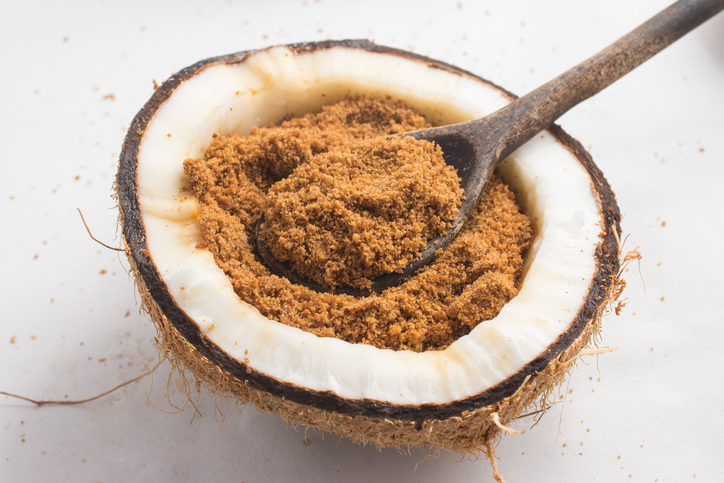
Cutting back on sugar? You may want to consider coconut sugar as an alternative to the regular white stuff. It tastes just as sweet, almost caramel like, but the difference is it comes from a natural source – the sap of the coconut palm tree. Best selling healthy bake books always recommend sugar alternatives such as these for protein cookies and breakfast muffins alike, but those such as coconut sugar have been used for centuries in the countries they are most produced in such as the Phillippeans.
Although we aren’t dismissing the fact this is still sugar (and it still needs to be used sparingly), it is, at least, lower on the glycemic index than normal sugar. According to the Philipine Department of Argiculture, it has a mark of 35, making it closer to fruit. It is touted as being more ‘nutritious’, such as antioxidants, fatty acids, iron and potassium, but you’d need a lot to reap the benefits. As far as sugar alternatives go, we love this in comparison to others for it’s likeness to real sugar rather than tasting like a fake.
Try it: We love Cocofina Organic Coconut Sugar, £5.49 which is unrefined, and according to them, produced by painstakingly concentrating the sap of the coconut blossom. It’s great used in baking recipes or added to raw protein ball or cake recipes. With no aftertaste like other sweeteners, we love it.
10. Spreads
There has been a nut butter revolution the past few years, sparked on Instagram. Adding a spoonful of fat to your smoothie or protein punch to your post-gym toast is appealing as well as super healthy and delicious (nuts about nuts, anyone?) More and more of us are on the hunt for the latest twist on a peanut, seed, cashew blend at Healthista HQ and will fight to get our hands on anything that says ‘cacao’ in the jar, such as Biona’s Dark Chocolate Spread – vegan too, amazing. Chia seed jam recipes are in abundance, if you have the time and bother to make it, considering the shop-bought kind is on the scary end of the sugar scale. But what HAS stolen our hearts is coconut jam, made with coconut milk and coconut sugar. The all-natural spread is a unique product that goes with pretty much anything your sweet tooth craves and is amazing eaten straight from the pot.
Try it: Coconut Merchant’s Coconut Jam, £5.99, is gluten free, vegan and according to them, relatively low GI. Add it to porridge or as a topping to your sweet desserts and pastries. Their Coconut Jam with Cacao, £6.99, is a twist on the original is to die for, with a caramel twist. Add it to your toast by all means, but you might find yourself eating it straight out of the jar. For the BEST, pure palm oil free peanut butter, we are adoring Biona’s Crunchy Organic Peanut Butter £4.39 which has no oily residue on top. Keep it in the pantry for a creamy texture or the fridge if you prefer it firmer.
READ MORE
7 things you didn’t know about organic beauty
7 BEST gluten free pasta alternatives
Like this article? Sign up to our newsletter to get more articles like this delivered straight to your inbox.



